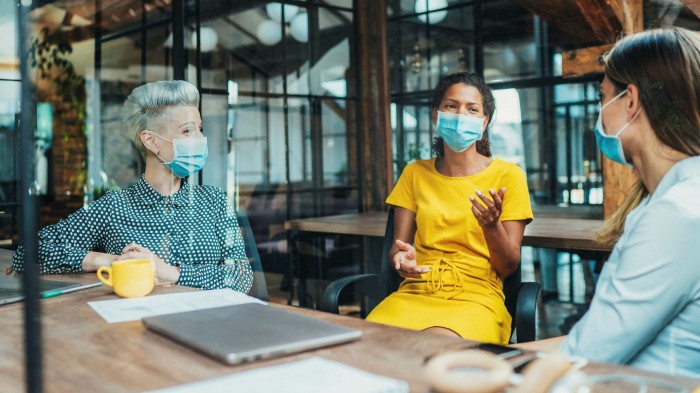Covid-19 reinvents law firm offices as hubs for teamwork and socialising

Roula Khalaf, Editor of the FT, selects her favourite stories in this weekly newsletter.
The glitzy offices of big law firms — with their modern art works, coffee bars and even hairdressers and in-house gyms — were designed to make life easier for lawyers working gruelling hours.
Clifford Chance’s London office even has a bar, called the Budgie, and a swimming pool with views high above Canary Wharf. Other law firms have sleep pods — little rooms where employees working on all night deals can grab some rest.
But lawyers are likely to be using these generous office perks a lot less even after the pandemic. Some firms have said they will let employees work from home permanently or part of the time. This is a massive shift for a profession often criticised for a culture of long hours and office presenteeism.
Linklaters recently announced a new global agile working policy that allows the firm’s employees to work from home 20-50 per cent of the time, and at Herbert Smith Freehills this will be up to 40 per cent, even if offices are fully open and social distancing rules are removed. Slater & Gordon has said homeworking for its 2,000 or so staff will become the norm.
Many lawyers now envisage a future in which the office becomes a teamwork hub with staff having the flexibility to work remotely part time or to meet colleagues or clients in the office a few days a week. They believe the office will remain a vital space for collaboration, socialising and training — particularly for trainees and for clients.
“We need to get away from the old-fashioned idea of a law firm,” says Jonathan Bond, global director of HR and learning at law firm Pinsent Masons, who was already working from home one day a week before the pandemic. “We need to think of work as something you do and not somewhere you go — so you might be sitting in a living room rather than in a meeting room.”
Hong Kong-based Justin D’Agostino took over as chief executive of Herbert Smith Freehills early this year, just as most of the firm’s 6,000 employees pivoted to remote working. The firm’s new policy follows a review of what worked well during the past few months, and has been met with enthusiasm from staff. One lawyer messaged him to say it was a “game changer” for working parents.
“I’m in no doubt offices will play a very important role going forward for law firms but I think it’s right to give people more flexibility when offices fully reopen,” Mr D’Agostino says. “This change is here to stay and we want to identify the benefits from it.”
He envisages days when teams will want to meet in the office to socialise, to negotiate the final stages of a deal or just before filing a complex piece of litigation. At other times they will work remotely. “We have done some complex transactions and big filings during the pandemic and it has all gone successfully,” he adds.
“In any walk of life people learn from their peers [by working next to them],” says Simon Davis, a litigator who is current president of the Law Society, which represents solicitors in England and Wales. But everyone has to look at what they use the office for: “Even in an office, people can be in their rooms on the phone all day.”

In a survey of 62 law firms across Europe by consultancy RSG about the impact of coronavirus on their work, just over a quarter said remote working had resulted in a rise in productivity. Nearly half said they expected a long-term change in the way office space is used. The pandemic has also accelerated the use of technology, such as video calls, electronic signatures and document management systems.
Law firms have started a phased reopening of their offices with some splitting staff into teams to manage capacity. Hogan Lovells started in early September, with staff split into two sets, with each allowed to go to the office on alternative weeks. The firm has now paused these plans in line with UK government guidance. Clifford Chance has reopened at 50 per cent capacity but employees continue to work from home if they prefer.
Yet many lawyers say endless Zoom calls are no substitute for face-to-face contact or chance conversations that can spark a creative idea.
Andrea Arosio, managing partner of Linklaters in Italy, said recently that while the pandemic had proved the firm could work well remotely, it also reinforced the benefits of interaction in person with clients and staff — as well as the value of offices as hubs of teamwork and learning.
Homeworking during lockdown meant that Susan Bright, regional managing partner at Hogan Lovells, was able to have dinner every night with her family, without the daily commute into London. But it has been harder to connect informally with colleagues. “I would spend a lot of time walking the corridors and putting my head round someone’s door but there is no digital equivalent,” she says.
Ms Bright notes that the world of work was already changing, accelerated by technology, before lockdown. “But there are real benefits of being together learning and collaborating.”
Homeworking has created challenges for lawyers in sensitive areas such as cyber security and disposing of confidential information, but the biggest concern has been the impact on junior lawyers and trainees, who rely on observing senior colleagues to learn. Trainee solicitors usually have four placements or “seats” of six months duration in different departments including stints abroad.
As a result, law firms are taking a more proactive approach to training. Mr Bond at Pinsent Masons says the firm took action after a survey of young lawyers in Australia, who said they were not getting enough on-the-job training. They are now permitted to listen in to client meetings.
Patrick McCann, global head of learning at Linklaters, says the firm put around 600 training sessions online for trainees and stepped up its monitoring and feedback. However, among trainees — the lawyers of the future — “there is certainly a willingness to come back into a physical location and learn”.
Comments